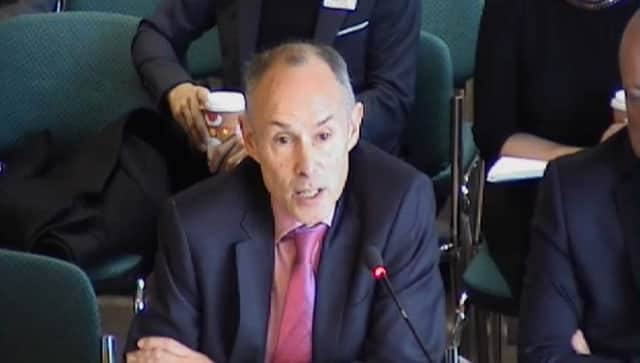Grammar heads defend 11-plus exam as campaigner demands ‘unfair’ test is withdrawn immediately


Dr Katy Simmons, from action group Local Equal Excellent called on the exam to be withdrawn until ‘grammar schools can show it is fair for all children’.
Dr Simmons, a school governor in Wycombe, was speaking before the county council’s education select committee, which called three grammar school headteachers to give evidence on the new 11-plus exam, which is it claimed should be less susceptible to private coaching.
Advertisement
Hide AdAdvertisement
Hide AdNew statisitcs released by Buckinghamshire Grammar Schools, the body which represents the county’s 13 selective schools, shows that only 16% of children from Aylesbury Vale – Bucks’ poorest district – passed the test, compared to 37% in the Chilterns – the county’s richest. There was a 64% pass rate for children in private education and only 4% for children on free school meals.
However, Alan Rosen, headteacher at Aylesbury High School, said a non-selective system would place more emphasis on postcodes and less on ability, with better schools located in pricier neighbourhoods.
He continued: “Different groups do perform differently in education and this is as much a concern to secondary schools as it is to the community.
“It would be surprising if the selection test results were different from the local picture – they reflect what goes on locally at key stage two.
Advertisement
Hide AdAdvertisement
Hide Ad“We are very keen that all testing is the best it can be and we will continue to revise the process every year.”
When asked about the large proportion (28%) out children who attend grammars from out of the county, he said the qualifying mark could be lowered but then Bucks grammar schools would be vastly over-subscribed and there could be a knock-on effect on secondary modern schools which would be under-subscribed.
“We want to keep the equilibrium as it is. Some Bucks grammar schools are very close to the border so it is quite right a significant amount of out of county attend them.”
Chairman of Bucks Grammar Schools and headteacher of Chesham Grammar School, Philip Wayne, said the new 11-plus exam now mirrored the primary school curriculum on maths and English, giving each child a more ‘level playing field’.
Advertisement
Hide AdAdvertisement
Hide Ad“We can’t stop people having their children tutored, we just have to try and mitigate the effects of that. I have never said it is tutor proof – I get very cross when I see that said by newspapers and campaign groups.”
The committee also heard from primary school headteacher Steve Butler, of Chartridge Combined, who said the new test had improved things.
He said under the old regime children he thought should have passed didn’t while other pupils who may have been coached passed who he did not feel were grammar school calibre.
“There’s a lot less surprises now,” he said.
However, he said that the new test has seen extreme scores being produced on either side of the 121 pass mark. “One criticism I have is children are getting 160-plus and other kids are getting 30. That is particularly demoralising for children. I am getting children come in and telling me they feel utterly demoralised and thinking they are stupid.”
Advertisement
Hide AdAdvertisement
Hide AdMr Rosen added that he did not want to see primary schools spending time coaching their pupils for the exam.
“We don’t want them focussing unduly on the selection test, which won’t be for 100% of their pupils.”
However, Councillor Phil Gomm, UKIP, questionned this, asking: “So those with money can pay for coaching, but you don’t want to allow it in primary schools?”
Councillor Robin Stuchbury, Labour, demanded more data on the test from the grammar schools, including a breakdown of pass rates based on a child’s social background and ethnicity.
Advertisement
Hide AdAdvertisement
Hide AdThe committee also heard from Dr Andy Gillespie, headteacher of Burnham Grammar in the south of the county, bordering Slough.
He said his intake was the ‘most deprived group of students bar one secondary school in Bucks and we are a grammar school’.
Speaking after the meeting, Dr Simmons said: “Today we have seen that the grammar schools don’t have a shred of evidence for their claims that the new 11+ exam is more resistant to coaching.
“Quite simply, the 11-plus continues to favour children from wealthier homes, while other children lose out. This is unacceptable. The exam should be withdrawn until and unless the grammar schools can show it is fair for all children.”
Advertisement
Hide AdAdvertisement
Hide AdRebecca Hickman, also from the group, added: “The reality is that the 11+ exam is testing for social background, not ability. The selective system doesn’t enable social mobility – it stops it dead in its tracks. How many more children from less advantaged homes and from Pakistani and African Caribbean backgrounds must lose out, before the grammar schools and BCC act to address the unjust effects of selection?”
At a press conference held following the committee, Mr Wayne said: “We are really pleased to be given the opportunity to talk to the scrutiny committee.
“We are aware of our responsibility to make sure the test is a true and fair reflection of a child’s ability.”